Yorkshire Wildlife Trust are looking for three dedicated people to join their Board of Trustees and to help guide a greener and wilder future for everyone in Yorkshire.

Yorkshire Wildlife Trust directly manages over 100 nature reserves, and is at the forefront of conservation work across Yorkshire, from groundbreaking partnership programmes such as Wild Ingleborough and Wilder Humber to their recent release of the first-ever State of Yorkshire’s Nature report.
We are managed by a Board of Trustees, who support and guide the charity to achieve a wilder Yorkshire that more people feel encouraged to enjoy. Each trustee brings their own experience to advise the Trust, and represents the Trust’s 45,000 members.
Trustees join for a limited time, which creates vacancies and ensures the Trust benefits from different experiences and fresh perspectives. No prior experience of being a trustee is required, and the Trust encourages everyone who feels they have skills and time to offer to apply.
The fastest birds in the world, peregrine falcons are sought after for racing and can sell for up to £250,000 in the Middle East. Poaching is a constant threat, with eggs and chicks stolen to supply the hidden market. Now, there are nationwide efforts under way to ring and take DNA from wild chicks ...

Gwent Wildlife Trust has officially opened a new reserve on the Gwent Levels. Bridewell Common NR was officially opened by Craig Bennett, Chief Executive of the Wildlife Trusts, at a special event on 20 June. At the event, Gwent Wildlife Trust thanked guests, including local community representative...

Gwent Wildlife Trust has officially opened a new reserve on the Gwent Levels.
Bridewell Common NR was officially opened by Craig Bennett, Chief Executive of the Wildlife Trusts, at a special event on 20 June.
At the event, Gwent Wildlife Trust thanked guests, including local community representatives, supporters, volunteers and staff, who had contributed to the acquisition and restoration of this beautiful 33-ha site.
A white-tailed eagle that broke its wing has taken to the skies after its parents nursed it back to health.

Footage captured from a boat off the Isle of Mull shows a "miracle" white-tailed eagle chick in flight, after it was nursed back to health by two unusually caring parents.
In an unprecedented display of extended eagle parenting, the two white-tailed parents skipped this year's breeding season to continue to tend to their year-old offspring.
The youngster's wing was broken when the nest fell to the ground during unseasonably wild weather last year.
The footage shows a bulge in the bird's wing - apparently a healed broken bone.
The tories have been incumbent for 116 years in my neck of the woods (the previous one was a whig). The surveys say that is likely to end this time. I am sooo looking forward to that.
The robot is capable of scooping up 500kg of waste from the surface of the water.

A robotic drone is being used to clean up the waterways in Leeds.
The cutting-edge technology has been developed in the Netherlands and is the first of its kind to be used in the UK, according to the Leeds Waterfront group.
The robot swims along waterways and can scoop up to 500kg of waste from the surface through a wide mouth, hence it being named the Waste Shark.
Volunteers are sought to continue the successful project in Shropshire.
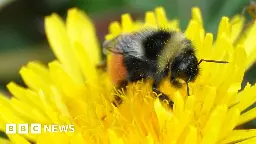
Rare bumblebee numbers are rising in Shropshire following a successful project to restore old hay meadows.
The National Trust is leading Stepping Stones, an initiative which aims to reconnect isolated patches of wildlife habitat across the Long Mynd and Stiperstones.
Jinlye Meadows, on the Long Mynd, is now thriving with wildflowers and insects and as a result, the population of bilberry bumblebees has increased.
Blue and great tits are "opportunistic foragers" and exhibit "episodic-like memory", a study shows.
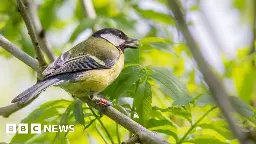
Small wild birds have demonstrated an ability to recall what they have eaten in the past, where they found it and when, a new study has shown.
Researchers at the University of Cambridge and the University of East Anglia in Norwich (UEA) studied the feeding habits of blue tits and great tits.
In the "first experiment of its kind to involve wild animals", the birds exhibited an "episodic-like" memory to cope with changes in food availability when foraging.
That memory system - a "conscious recollection of personally experienced events" was previously thought to be "uniquely human", researchers said.
An otter has been spotted for the first time at a "wilded" site on the Somerset Levels that used to be intensively grazed farmland.
The animal was captured by a night-time camera at Honeygar in the Avalon Marshes.
In a post on Facebook, Somerset Wildlife Trust said it was "excellent news" for the 81-acre site, which used to be a dairy farm.
The trust wrote: "We've now been managing the site for over two years, and vital monitoring work has been undertaken to help us build up a better picture of some of the different species in the area.
Despite declining numbers of glow worms, the South Downs is home to a large population.
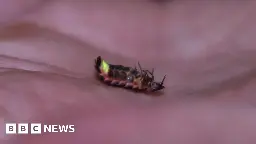
It’s late at night on the South Downs as a group of ardent wildlife spotters gather round a pair of glow-worms appearing to copulate.
While the insect is declining in many parts of the UK, the healthy population of glow-worms at the Sussex beauty spot is drawing in spectators.
Watched by a small crowd, the insects don’t seem to be put off by the lack of privacy.
i is calling on the next government to get to grips with chemical pollution as part of its Save Britain's Rivers manifesto
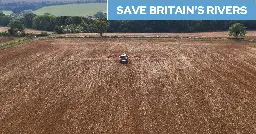
Vast swathes of the British countryside are being sprayed in pesticides containing “forever chemicals” that pollute our air, soil and waterways, and pose a threat to public health.
An analysis by the environmental group Fidra, shared exclusively with i, found that pesticides containing potentially dangerous chemicals were sprayed on the equivalent of 10.7m hectares of arable farmland in 2022 – an area roughly the size of Iceland.
The pesticides contained PFAS, or per- and poly-fluorinated alkyl substances, a group of more than 10,000 industrial chemicals that studies have linked to health problems, including cancer, infertility and developmental issues.
Last, week the Scottish Parliament passed the Circular Economy Bill.

Last, week the Scottish Parliament passed the Circular Economy Bill.
The Circular Economy Bill was introduced by the Scottish Government in June 2023. Now that it has passed, it means the country will be getting a new law to bring us another step closer to reducing beach litter in Scotland.
Our economy is still based on what is called a linear model where we take resources from the planet, make something, use it for a short time and then throw it away. When it is thrown away it is sometimes recycled and sometimes landfilled or incinerated. Unfortunately, some of it also leaks into our natural environment and impacts our incredible Scottish wildlife and habitats as well as the stunning coastline Scotland is world renowned for.
The National Trust for Jersey is "very excited" about the first confirmed breeding since 1997.
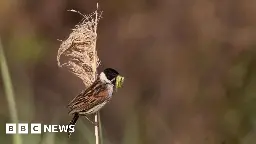
A pair of reed buntings has successfully bred in Jersey for the first time in almost 30 years.
The National Trust for Jersey said it was "very excited" about the first confirmed breeding in the island since 1997.
The trust said the species normally migrated to breeding grounds in eastern Europe and Scandinavia.
Experts believe songbird is suffering from Usutu virus, first detected in UK in 2020
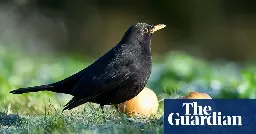
Beloved by Shakespeare and the Beatles, the blackbird and its sweet song have captured the imagination of Britons for centuries.
But now the songbird is facing decline, and the British public has been asked to contribute to a survey by the British Trust for Ornithology (BTO) to find out why.
Their numbers have plummeted in Greater London and southern England at rates not seen in the rest of the UK.
The RSPB says wildlife is thriving at the expanded Lakenheath Fen wetland at a "startling" rate.
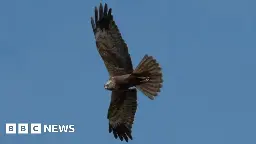
An RSPB warden has admitted he is "startled" by how rapidly wildlife has started colonising a reserve's newest piece of wetland.
It is a year since the charity began work transforming arable fields into a watery habitat as part of an expansion of its Lakenheath Fen reserve on the Suffolk/Norfolk border.
Site manager Dave Rogers said: "We've seen some immediate reaction from some species - and marsh harriers in particular."
The birds, which are of conservation concern, are breeding elsewhere on the reserve and have found the new habitat a rich source of prey.
The farthest north this species used to be seen was the Channel Islands but it is now common in Bedfordshire
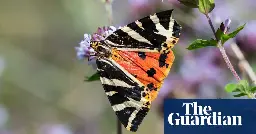
The Jersey tiger, Euplagia quadripunctaria, is one of the more spectacular British moths. Rather than trying to blend in with its surroundings, its dramatic black and white wings, with additional orange flashes when flying, seem to be saying “eat me if you dare” and get a stomachache. Most potential predators appear to heed the warning.
Unlike some other moths, the caterpillars eat a variety of roadside weeds including nettles, and those hatched in September shelter through the winter on rough patches of ground with plenty of food plants.
The farthest north this species used to be seen was Jersey (as the name suggests) but global heating has transformed its fortunes.
Highlands and Islands Airports Limited staff have teamed up with conservation programme Species on the Edge to create safe nesting habitat for the rare Little Tern at Islay Airport.
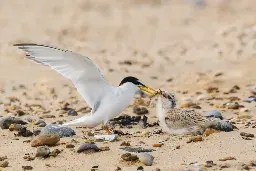
Highlands and Islands Airports Limited staff have teamed up with conservation programme Species on the Edge to create safe nesting habitat for the rare Little Tern at Islay Airport.
Little Terns fly to Scotland in spring to breed, looking for beaches on the coast and islands where they can nest in colonies. Unfortunately, this chosen habitat of Little Terns is often prone to disturbance by humans, dogs, and flooding. Little Terns are very sensitive to disturbance and can abandon nests, eggs and chicks if disturbed.
The latest breeding seabird census (Seabirds Count: 2015-2021) shows that Little Tern have declined by 29% in the last 20 years in Scotland, with the Argyll and Bute region seeing a much larger decline of 46% in the same time period. Creating disturbance-free areas with suitable nesting material is one of the most important actions that can be taken to help protect Little Terns.
The Mediterranean gull chick is believed to be a week old and a rare cause for celebration.
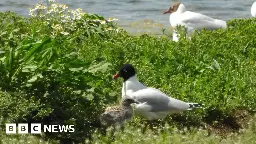
A species of bird has been born at a nature reserve in Lincolnshire for the first time in its history.
The Mediterranean gull chick was spotted by volunteers at Lincolnshire Wildlife Trust's Whisby Nature Park on 27 June.
The park said its the first time the species has hatched at the site, as nesting Mediterranean gulls have always failed at the incubation stage on prior occasions.
The expanse of beautiful red flowers is the result of letting nature take its course.
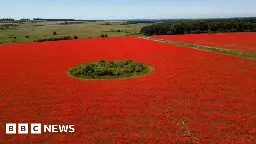
Striking images have been captured of a huge field of poppies stretching almost as far as the eye can see.
The field has been rewilded by the landowner in Great Massingham, Norfolk.
The soil was ploughed and harrowed before being left for nature to run its course, with the result being a huge sea of red poppies.
Campaigners are concerned over the forest’s impact on wildlife, including black grouse.
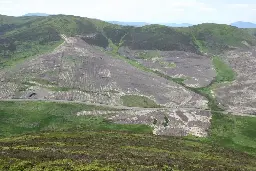
A forest plantation planned for a national scenic area is set for a court battle over claims it could cause “landscape-scale destruction”.
A 700-hectare conifer forest is being planted around a countryside walkway named after one of Scotland’s most celebrated writers: John Buchan, author of The Thirty Nine Steps.
The plantation, which will predominantly be non-native Sitka spruce, is already being put in the ground at Stobo Hope, near Peebles.
A moth garden at Hampton Court Palace shows off plants that can be grown to help the insects, which are threatened by habitat loss
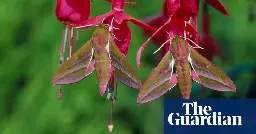
Everyone loves bees and butterflies, but now moths are coming into the spotlight (as long as they don’t fly around it).
The moth expert Charles Waters has seen a surprisingly rapid increase in interest in moths from the younger generation as, he believes, people become more aware of their beauty and diversity, as well as their importance as pollinators.
“Moths are more significant pollinators because there’s so many of them. In the UK, there are 59 butterfly species, but there are 2,500 moth species,” he said.
An interesting point, but I don't think that is as clear cut as you suggest.
The article mentions swift boxes, for example. Swifts, of course, return to the same nests each year anyway. There is a specific parasitic louse that is present in most swift nests, as I understand - but they appear to tolerate the parasitic load regardless.
Bats, on the other hand, reduce parasite buildup by moving from one roost to another across the year - but they will reuse the same roosts and hibernaculae in subsequent years.
I'm not sure exactly what they mean by insect bricks either, but assuming that it something like bee hotels, well, I am not very familiar with these overall, but having watched the red mason bees on the south side of my home for the last couple of years, they certainly seem to be using the same holes more than once.
The critical thing, overall, will be whether they use designs that have been developed by organisations who have done their research - of which are many available, that they have trying to get the building industry to use for a good while now - rather than simply greenwashing gimmicks.
They are extraordinary aren't they? Really lucky to have them in your garden.
I'd say they probably were adders if you caught them basking on the path. In general grass snakes are more common, but they typically get out of the way at the slightest disturbance, so all you usually see of them is their tails vanishing in to the undergrowth. Adders aren't as quick off the mark, so are more often seen on paths. They prefer heathland and more open, sunny spots, where grass snakes go for longer grassy areas and often are near water.
That is assuming that it was actually a snake. Slow worms are often mistaken for snakes and will also spend time basking on tracks. They are usually much lighter in colour and have a smooth pale, metallic bronze look.
Adders are more obviously scaled and are a deeper grey or brown colour with a very distinctive dark zigzag pattern on their backs.
They almost certainly won't have been smooth snakes or anything else though.
Hmm - that's Yahoo for you. I try to avoid it as mush as possible. I couldn't find the same piece elsewhere at the time, but a month on this looks like the same article..
After a tense 3-way tie, a tie-breaking roll of the die resulted in this atmospheric woodland shot by YungOnions becoming the winner and our new summer banner.
As /u/Steve@startrek.website suggests, that certainly looks like sand that has been washed out by water around the hole, so I don't know whether that's relevant.
Either way, the hole itself doesn't look like a badger snuffle hole or latrine, so I'd say fox is more likely.
At the point where you and the AI can see someone straightening their tie in a certain way and you and the AI can exchange a single wordless glance and you both burst out laughing 'cos it was just like that thing that you both saw 6 months ago and found hilarious then - then maybe.
Not before.
If you have some late entries and can get them over to me before midnight, I will delay putting up the voting thread till then!










